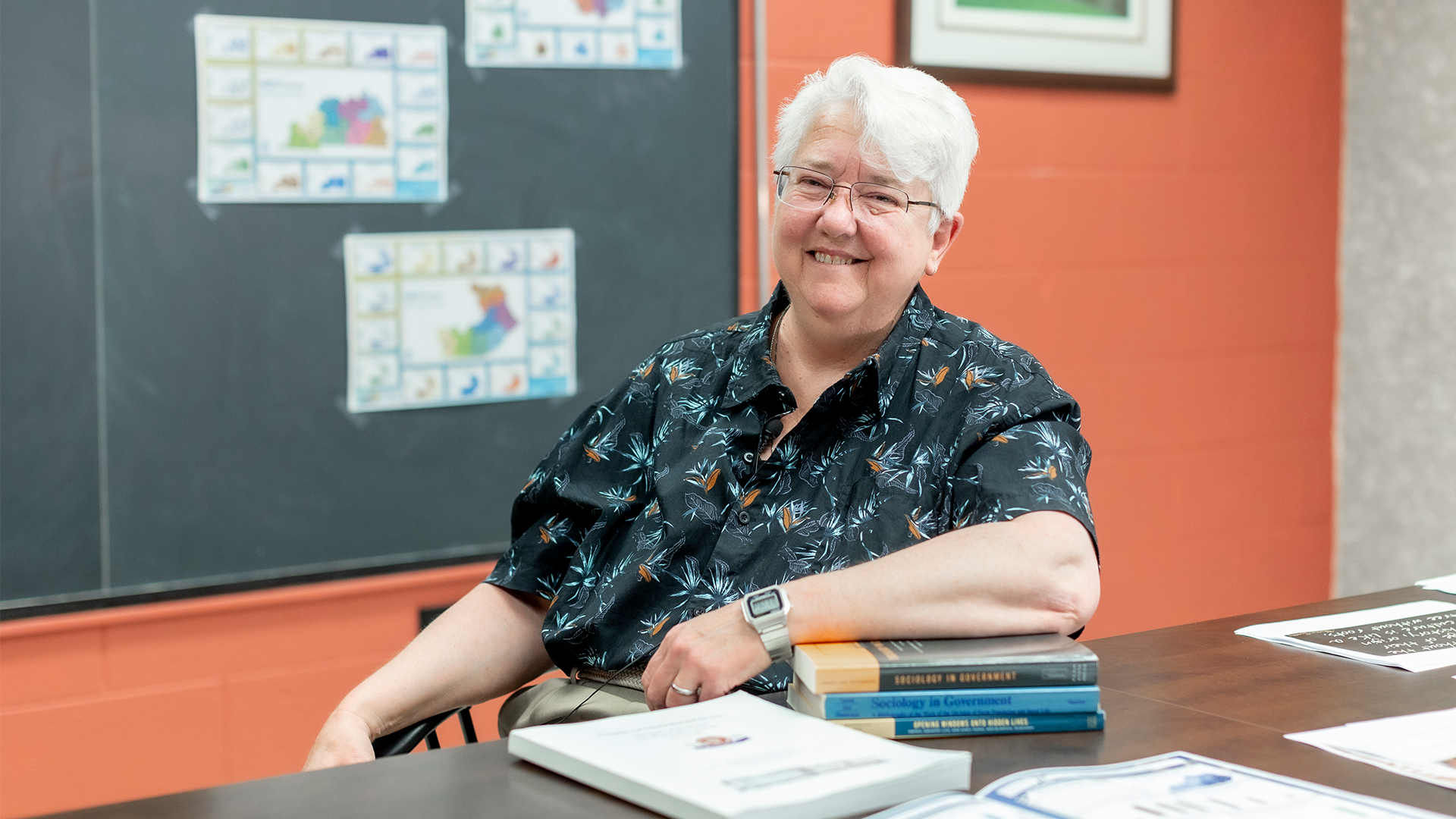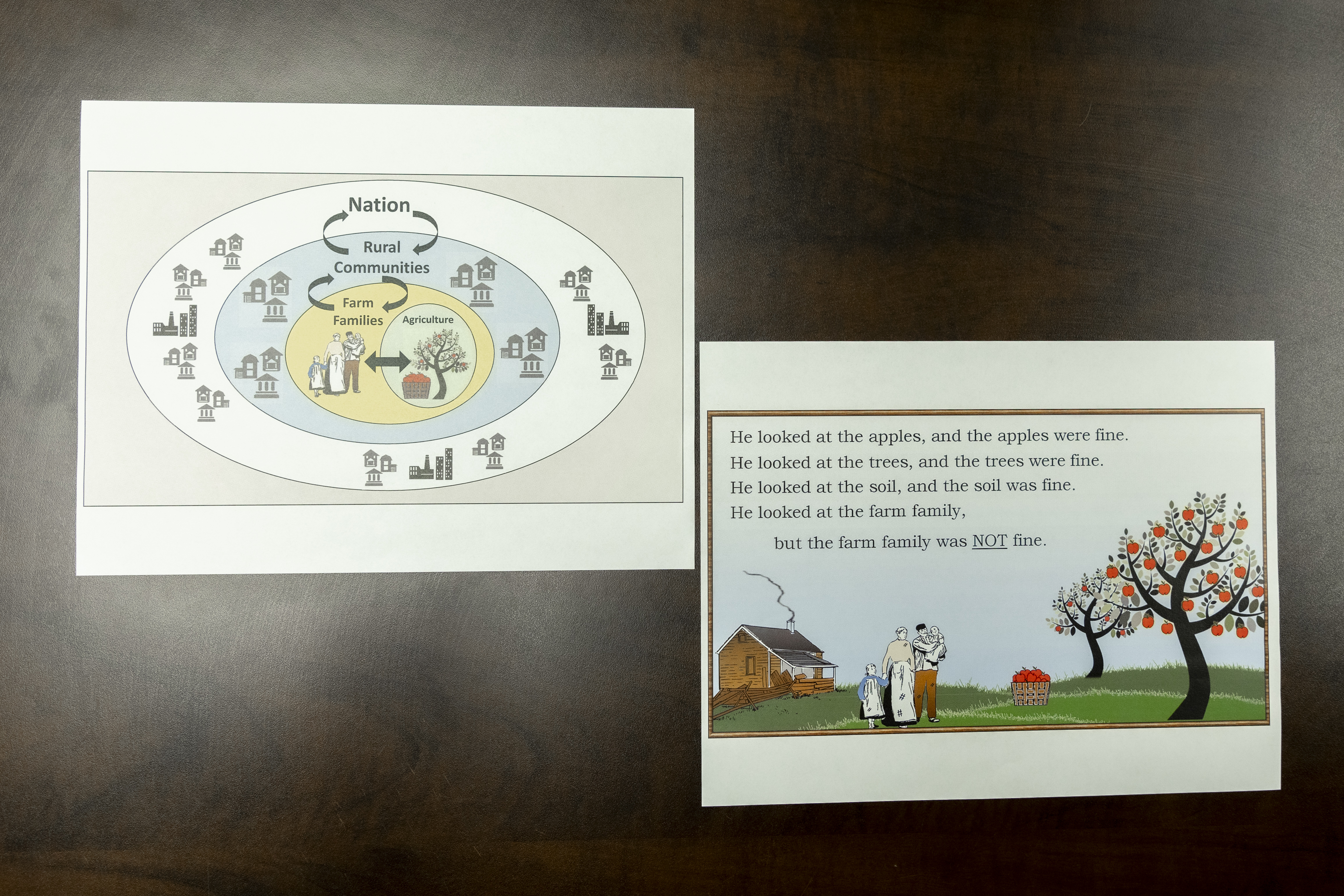'A lasting impact’: UK rural sociologist helps Kentucky’s communities through data
'A lasting impact’: UK rural sociologist helps Kentucky’s communities through data


If there is one phrase that sums up Julie Zimmerman’s work, it’s “You had me at rural.”
As the Milton Coughenour Professor of Rural Sociology in the University of Kentucky Martin-Gatton College of Agriculture, Food and Environment Department of Community and Leadership Development and applied demographer for UK Cooperative Extension, Zimmerman’s career has been focused on all things rural.
Nicknamed “Dr. Data” and “the Numbers Lady,” Zimmerman’s extension efforts involve providing data related to Kentucky residents. Through her work in rural sociology, which is applied sociological research focused on rural people and places, Zimmerman applies “sociological tools to practical ends.”
Twenty-seven years into her career at UK, Zimmerman continues to demonstrate her commitment to Extension and to Kentucky’s communities.
'The human element in agriculture’
Helping with historical research first got Zimmerman interested in rural sociology. After earning her bachelor’s and master’s degrees in sociology, she received her doctorate from Cornell University. The summer before she started at Cornell, Zimmerman made calls to see if anyone needed a graduate student.
Olaf F. Larson, a retired professor working on the history of the U.S. Department of Agriculture’s Division of Farm Population and Rural Life, hired Zimmerman. Zimmerman’s introduction to rural sociology came through helping Larson create a bibliography and book about its history. The more she learned, the more interested she became.
“I tell my students to this day—make the phone call, send the email,” Zimmerman said. “My entire trajectory in rural sociology came through that, then I turned to doing rural demography, and voila.”
There’s a story about rural sociology’s origins that Zimmerman read somewhere and still shares, though she stresses that it’s “Julie’s version.”
As the story goes, Cornell horticulturalist Liberty Hyde Bailey was visiting apple orchard farms during the agricultural depression at the end of the 19th century.

He looked at the apples, and the apples were fine. He looked at the trees, and the trees were fine. He looked at the soil, and the soil was fine.
But when he turned and looked at the farm family, the farm family was not fine.
During this time, Bailey and others were coming to realize that agricultural production does not exist in a vacuum.
“Agriculture is more than a farmer’s production techniques on the farm and the quality of the soil,” Zimmerman said. “It’s about the people, too.”
Seen as addressing “the human element in agriculture,” rural sociology and other social sciences became part of agricultural colleges across the nation.
Today, Zimmerman continues to conduct research on the history of rural sociology, and she is making history as the first woman and second youngest person to serve as historian for the Rural Sociological Society.
'Easy access to data’
Zimmerman’s Extension work focuses on helping make secondary data accessible and understandable for Kentucky county agents and communities to use in local decision-making.
She developed and manages Kentucky: By The Numbers, which provides access to commonly used county-level data for all 120 counties in Kentucky. This resource helps UK Extension personnel understand and apply secondary data for planning, grants, evaluations and more.
Data series examples include population projections, child poverty rates, farm producer demographics and, most recently, secondary data for the Extension Statewide Community Needs Assessment.
In 2020, the COVID-19 pandemic revealed the need for local data on at-risk populations. Zimmerman responded, quickly creating a special data series for counties. Later in the year, as national discussions on inequality began to intensify, she frequently saw race and ethnicity data being shared on the news.
“To help people understand the makeup of their counties, I wanted to make sure that there was easy access to data on race and ethnicity,” Zimmerman said.
Zimmerman hosted a four-part series that ranged from a general overview to data broken down by age group, particularly youth. She also explained how collecting race and ethnicity data has changed throughout history and that “how we count something is not neutral.”
“Counting means making decisions—deciding things like who’s included in a particular definition and who is not, where do we draw the lines between categories, what do we call the categories...these are all decisions that are made within a social and societal context,” she said.
Being a rural sociologist equips Zimmerman to understand and contextualize data, not only comparing Kentucky to the nation but also comparing the present moment to history.
“Interestingly, rural sociologists have long filled this role in colleges of agriculture and Extension, so in a way I’m carrying on that tradition,” Zimmerman said.
It’s an impactful tradition: Data from her work has been used in community planning throughout the state, from building a new school to securing grant funding for local efforts.
“I hope that something I did had a lasting impact for the state, for the college, for the discipline,” Zimmerman said.
Access Zimmerman’s Kentucky: By The Numbers at kybtn.ca.uky.edu.
# # #
The Martin-Gatton College of Agriculture, Food and Environment is an Equal Opportunity Organization with respect to education and employment and authorization to provide research, education information and other services only to individuals and institutions that function without regard to economic or social status and will not discriminate on the basis of race, color, ethnic origin, national origin, creed, religion, political belief, sex, sexual orientation, gender identity, gender expression, pregnancy, marital status, genetic information, age, veteran status, physical or mental disability or reprisal or retaliation for prior civil rights activity.
Extension


